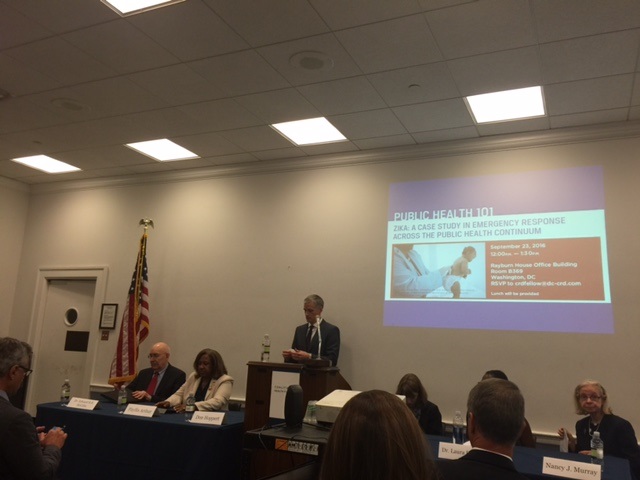|
Budget/Appropriations
Negotiations continue on a continuing resolution (CR) to fund government programs past the September 30 deadline for the new fiscal year. It appears that most details have been resolved; however, Democrats are pushing for emergency funding for the Flint, Michigan water crisis to be included, among other details. It is unclear whether the President would veto the CR without these fixes. AUCD is pleased to see that the bill does provide $1.1 billion to address the Zika virus. Hopefully, the impasse will be resolved by the end of this week. If it is not, our government will face a shutdown. Agencies have received a memo to help them prepare for such scenario. The CR being considered now, if passed, will extend to December 9.
Health Care
Zika
On Friday September 23rd, the AUCD public health team joined a coalition of other public health and disability organizations to participate in and support Zika Day activities on Capitol Hill (see the AUCD Statement on Zika Virus here). They attended the Coalition for Health Funding Zika Briefing in the Rayburn office building as well as participated in dropping off materials at congressional offices educating Congress about the need for funding. The team also met with the Senior Legislative Assistant for Rep. Robert J. Wittman (R-VA) who is the co-chair of the Congressional Public Health Caucus to discuss the need for Zika funding for developmental monitoring.

Medicare Post-Acute Care
The Coalition to Preserve Rehabilitation (CPR), of which AUCD is a member, submitted comments on the Medicare Post-Acute Care Value-Based Purchasing Act of 2015 (H.R. 3298). Comments focused on the use of the Medicare Spending per Beneficiary (MSPB) measure, which is currently the only measure being contemplated. MSPB is an economic measure to assess Medicare use and determines the productivity of a provider within a given setting, or a type of provider compared to another type of provider. CPR believes that the Post-Acute Care Value-Based Purchasing (PAC-VBP) program should not measure MSPB without simultaneously measuring quality, function, and quality of life outcomes so that the Medicare program knows what it is getting for its payments to providers.
Housing
The Co-Chairs of the CCD Housing and Rights Task Forces, of which AUCD is a member, provided comments on the proposed Affirmatively Furthering Fair Housing: Local Government Assessment Tool-Information Collection Renewal: Solicitation of Comment 30-Day Notice Under Paperwork Reduction Act of 1995. Both the CCD Housing and Rights Task Force recognize and appreciate efforts by the Department of Housing and Urban Development (HUD) to address in the proposed Assessment Tool some of the comments previously submitted by the task forces. However, there remain concerns that significant gaps in HUD-provided national data will impede local governments in adequately assessing and addressing the fair housing needs of people with disabilities. To ensure that people with disabilities are not left out of fair housing planning efforts and deprived of needed housing opportunities, these task forces have recommended several ways to strengthen the Assessment Tool. The Housing and Rights Task Forces recommend a three-part approach to ensure the housing needs of people with disabilities are assessed to the same degree as the housing needs of other protected classes.
Criminal Justice
The House passed H.R. 5963, the Supporting Youth Opportunity and Preventing Delinquency Act, which supports state and local efforts to help at-risk youth and rehabilitate juvenile offenders. The bill, which was sponsored by Rep. Carlos Curbelo (R-FL) and Rep. Bobby Scott (D-VA) reauthorizes the Juvenile Justice and Delinquency Prevention Act, which provides grants for state youth rehabilitation projects. The bill passed with broad bipartisan support and must now receive Senate approval.
Lifespan Respite Care Reauthorization
AUCD has been meeting with Member of Congress urging them to cosponsor of H.R. 3913, the Lifespan Respite Care Reauthorization Act of 2015. Introduced by Rep. Jim Langevin (D-RI) and Rep. Gregg Harper (R-MS), this legislation reauthorizes the Lifespan Respite Care Act of 2006 at $15 million per year over five years in order to support coordinated respite services for family caregivers. AUCD encourages its members and allies to use action center to educate Members of Congress about this important policy and legislation.
Social Security
On September 26, the Social Security Administration published final rules in the Federal Register that use revised criteria to evaluate claims involving mental disorders in children and adults. The rules in question were originally proposed in a Notice of Proposed Rulemaking (NPRM) in August. The revisions include updated terminology for disorders that reflects the DSM-5 and the addition of a new listing for trauma and stressor-related disorders that is separate from the listing for anxiety disorders. The revised final rules will come into effect on January 17, 2017.
Disability Community Act
On September 20, the American Network of Community Options and Resources (ANCOR) sponsored a congressional briefing on the Disability Community Act (H.R. 5902). Introduced by Representative Paul Tonko (D-NY) on July 14, 2016, H.R. 5902 aims to temporarily increase the Federal Medicaid assistance percentage for expenditures under the Medicaid program by three years in order to help states build capacity and comply with the Department of Labor's (DOL) overtime rule, as well as other new rules that affect providers and direct care workers serving individuals with disabilities and families.
Tuesdays with Liz: Disability Policy for All
During this week's edition of Tuesdays with Liz: Disability Policy for All, Liz interviews Michelle Bishop about the importance of voting. In case you missed last week's edition, Liz interviewed Joe Caldwell about the Money Follows the Person (MFP) program.
For more from AUCD, follow @AUCDNews and like AUCD on Facebook
For updates from our Executive Director Andy Imparato, follow @AndyAUCD.
For more policy news, follow Kim on Twitter at @kmusheno
For definitions of terms used in In Brief, please see AUCD's Glossary of Legislative Terms
|
